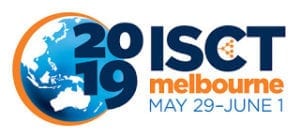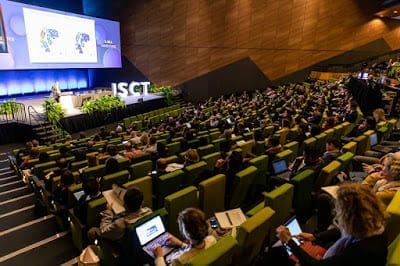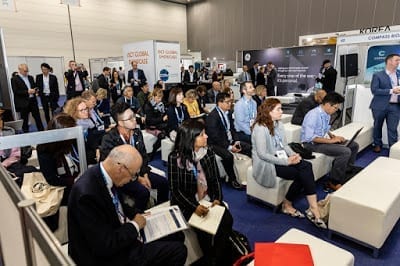
The 2019 International Society for Cell and Gene Therapy (ISCT) Annual Meeting brought clinicians, regulators, and industry to Melbourne, Australia to collaborate and share progress in the rapidly developing field of Cell & Gene Therapy. Mesenchymal Stem/Stromal Cells (MSCs) were a major focus of the conference with an entire pre-conference workshop devoted to the Global Clinical Trial Landscape of MSCs as well as multiple sessions and keynotes throughout the conference. RoosterBio was active in the technical sessions and presented new technology on the industrial scale-up of both MSCs and MSC-derived extracellular vesicles, as well as announcing a partnership with Tissue Regeneration Therapeutics to make umbilical cord -derived MSCs broadly available. Other key themes at this year’s meeting were: addressing global regulatory compliance, scalability, reducing the cost of goods, exciting developments in exosomes/extracellular vesicles and recent advances in many different cells and gene therapy strategies.
MSC Progress in Clinical Trials, Manufacturing, and Comparability
Progress in clinical trials across the globe was the focus of a full-day pre-conference workshop. Dr. Robert Mays of Athersys provided an update on their stromal cell product Multistem as they move into Phase III clinical trials for ischemic stroke patients and continue to investigate the treatment’s mechanism of action with immune regulation possibly being one key piece. Dr. Yufang Shi echoed this, highlighting work to pre-condition MSCs to bolster immune responses. Dr. Eleuterio Lombardo of Takeda discussed the development of Alofisel, an allogeneic MSC product that has been approved in Europe for perianal fistulas in Crohn’s disease. Some challenges in clinical trials were highlighted, such as inconsistent responses between pre-clinical and clinical studies.
 |
| Photo courtesy http://www.isct2019.com/photo-gallery/ |
Dr. Lombardo pointed out an often-stated public opinion that successes in animal studies are often attributed to the use of “fresher” cells, and that these results may not be repeatable in human clinical trials because clinical trials often use cells that have been expanded and cryopreserved. Dr. Lombardo presented his review of the literature which did not support this opinion. Instead, he found that many studies did not state whether MSCs were cryopreserved or fresh, and surprisingly, it was also very rare that studies reported the Population Doubling Level (PDL). Furthermore, in his recent study where fresh and cryopreserved cells were
directly compared in a pneumosepsis model, he observed that fresh cells did not offer a significant advantage [1]. Dr. John Davies of Tissue Regeneration Therapeutics presented on umbilical cord MSCs as a platform for gene therapy. RoosterBio’s founder and Chief Product Officer Dr. Jon A. Rowley spoke during the pre-conference MSC workshop on RoosterBio’s innovative strategy of creating standardized and scalable cell and media systems for the Regenerative Medicine Industry, and highlighted paths for radically shortening product development timelines and shortening path to the clinic. Dr. Josephine Lembong of RoosterBio also presented a poster on comparability of 2D flasks and 3D bioreactor expanded hMSCs, with comparability of the two systems across growth rates, PDLs, flow markers, multilineage differentiation, angiogenic cytokine secretion as well as inducible immunomodulatory functions of the cells.
Addressing a Global Market
The challenge of harmonizing global regulations and manufacturing cell therapy products for global compliance was a common thread during the conference. Discussions centered around the challenge of understanding and complying with different countries’ regulations related to donor screening, raw materials, manufacturing, and clinical trial design, with calls for more uniformity across regions. It was noted that each geographical region has its own regulatory stringency, and that accelerated regulatory frameworks present in certain regions play a role in the timeline for a product’s market approval. For example, Dr. Dominic Clarke from HemaCare discussed some differences in donor screening requirements between the US and EU. Marlin Frechette, Director of QA/RA at Irvine Scientific discussed using risk assessments early in the design process to keep manufacturing consistent for a product being produced and distributed across the world. Specifically, she discussed avoiding development of a product that might not meet global regulatory requirements and including this as an early design requirement. Dr. Kilian Kelly from Cynata talked about the logistical challenges associated with having one global manufacturing facility and multiple regional depots. For example, there are different requirements for donor preference and batch release based on the region. Tony Lee from Medipost emphasized the importance of clinical development strategy and clinical trial study design which may be different depending on the market. Their CartiStem product for osteoarthritis was successful in this regard with market approval in Korea and clinical trial approval by the US FDA.
New Advances in EVs
Extracellular Vesicles were highlighted in multiple sessions with presentations ranging from preclinical research to clinical translation. Dr. Sai-Kiang Lim chaired a session titled “Challenges in Translating MSC EVs into the Clinic” where the challenges of EV characterization and manufacturing were discussed. Dr. Bernd Giebel of Essen University Hospital presented on the development of a Mixed Lymphocyte Assay to better predict potency in animal models. Dr. Elizabeth Shpall of MD Anderson presented on progress moving towards clinical trials for pancreatic cancer with MSC EVs. Posters related to EVs ranged from demonstrating therapeutic effects in animal models to downstream processing. Dr. Katrina Adlerz from RoosterBio presented posters related to RoosterBio’s cell and media systems for rapidly generating significant volumes of MSC-EVs for both research and product development, strategies for increasing EV yield, quality characteristics of MSC-EVs, as well as manufacturing EVs in bioreactor systems with 2D comparability.
Tackling Business Model Challenges
 |
| Photo Courtesy http://www.isct2019.com/photo-gallery/ |
Creating a more sustainable Regenerative Medicine business model by lowering Cost of Goods (COGs) of therapeutic products via manufacturing efficiencies was also a popular topic throughout the Commercialization Tracks. Dr. Jon Rowley presented a talk around reducing COGs by enhancing media productivity to help enable patients’ access to affordable cell and gene therapies. The take home message was that cell culture media is often the largest cost driver of cell therapy products but that it is also critical to realize the “hidden costs” that are associated with media – as this concept is applicable to everyone working in the cell therapy field. Automation was also presented as a key to COGs reduction. ATVIO Biotech, an Orgenesis business, showcased an innovatively designed automated, fully closed bioreactor product called the ADVA, stirred tank CART cell manufacturing platform, with integrated wash & volume reduction capability that could drive overall cost down by >50% – as well as potentially making these therapies available bedside in the clinic.
As the cell therapy field continues to address scalability, new technologies were presented. Various bioreactor platforms were highlighted: PBS Biotech with their vertical-wheel technology, Terumo with their hollow-fiber technology, and Pall’s stirred tank bioreactors, among many others. Downstream processing platforms are equally critical. For example, the Gibco CTS Rotea Counterflow Centrifugation System was highlighted, as well as Terumo’s automated fill and finish system. These technologies were developed for a range of applications; therefore it is always important to go through the exercise to evaluate and determine which technology works for your intended application and scale.
Recent Advances in Other Cell Therapies
In addition to MSCs, the conference highlighted recent advances in exciting cell therapies focusing on immune-oncology, tissue engineering, and regenerative medicine. Dr. Saar Gill from the University of Pennsylvania talked about his approach with CAR T-cell therapy to overcome the absence of cancer-specific surface markers [2]. Development of iPSC-derived MSC therapies was also highlighted with an emphasis on the capability to achieve large-scale manufacturing from one single donor. Igor Sluvkin, co-founder of Cynata Therapeutics, spoke about their manufacturing capability of producing 19M clinical doses of their iPSC-derived Cymerus™ MSC product from one single donor. Dr. John Rasko from The University of Sydney School of Medicine presented the results of the successful Phase I Cymerus clinical trial for acute GvHD. This is a promising approach to overcome supply limitation, reduce COGs, and also limit donor to donor variability, which seems to be a large issue being tackled by product developers utilizing adult MSC sources.
Overall, the excitement in the cell and gene therapy field, and really all of Regenerative Medicine, continues to build and we look forward to next year’s meeting in Paris!
References:
- Perlee et al., 2019. Human Adipose‐Derived Mesenchymal Stem Cells Modify Lung Immunity and Improve Antibacterial Defense in Pneumosepsis Caused by Klebsiella pneumoniae. Stem Cells Transl Med. doi: 10.1002/sctm.18-0260 PubMed
- Kim et al., 2018. Genetic Inactivation of CD33 in Hematopoietic Stem Cells to Enable CAR T Cell Immunotherapy for Acute Myeloid Leukemia. Cell173(6):1439-1453.e19. doi: 10.1016/j.cell.2018.05.013 PubMed
